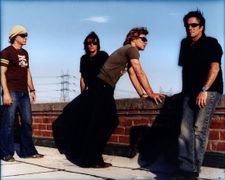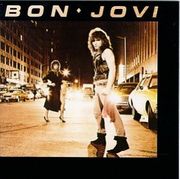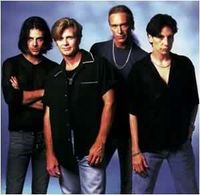(1996-1998) OK Computer
Thom Yorke said that The Bends succeeded because "we had to put ourselves into an environment where we felt free to work. And that's why we want to produce the next one ourselves, because the times we most got off on making the last record were when we were just completely communicating with ourselves, and John Leckie wasn't really saying much, and it was just all happening".
One new song was already recorded for the album: "Lucky", which was recorded in September 1995 for the War Child charity's The Help Album. Radiohead also contributed two songs to Baz Luhrmann's 1996 adaptation of Romeo and Juliet, "Talk Show Host" and "Exit Music (For a Film)." The former was a remix of one of the b-sides to "Street Spirit (Fade Out)," a single from The Bends. The latter was a new song, to be included eventually on the band's next album.
With the assistance of their engineer Nigel Godrich, Radiohead produced their next album themselves, beginning work in early 1996. By July they had recorded four songs with producer Godrich at their rehearsal studio, Canned Applause, a converted shed, near Didcot, Oxfordshire. They had hoped to stay away from traditional recording studios, fearing the bad vibes they'd previously set off in the band. Having learnt from The Bends, they decided to perfect the songs live, touring as an opening act for Alanis Morissette, before completing the record. The rest was recorded in actress Jane Seymour's 15th-century mansion in St. Catherine's Court near Bath. The recording sessions were relaxed, with the band playing at all hours of the day, recording songs in different rooms, and blasting DJ Shadow, Ennio Morricone and the Beatles' "I Am the Walrus" through the house for inspiration. By the end of 1996 the album was finished and by February and March it was mixed and mastered.
Radiohead released OK Computer in the summer of 1997, to great critical acclaim. A melodic rock album, OK Computer found Radiohead introducing uncommon musical elements, experimenting with ambience and noise to create a set of songs that many consider a high point of twentieth-century rock music. It included the singles "Paranoid Android," "Karma Police," and "No Surprises" (as well as "Let Down," a fan favourite whose planned single release was cancelled). In 1998, OK Computer received a Grammy for Best Alternative Album, and a nomination for Album of the Year.
OK Computer was followed by a world tour, nicknamed "Against Demons," the band's biggest yet. Grant Gee, the director of the "No Surprises" video, accompanied the band on their tour and filmed it, which resulted in the "fly on the wall" documentary Meeting People Is Easy (released in 1999). Rather than stereotypical rock n' roll behaviour, the film depicted the band's disaffection from the music industry and showed their burnout as they progressed from their first concert dates in mid-1997 to mid-1998, nearly a year later. The band also released a compilation of their music videos (7 Television Commercials), and two EPs No Surprises/Running From Demons (1997) and Airbag/How Am I Driving? (1998) during this time. The latter EP, however, has songs that bridge the progressive alternative rock of OK Computer and their subsequent atmospheric, electronic work.
(1999-2001) Kid A and Amnesiac
Exhausted by fame and on the verge of burning out following their 1997-1998 world tour, the band spent the next year in relative quiet. Thom Yorke later admitted that during that period the band were close to splitting up, and that he himself had developed mild depression. Radiohead's only appearance later that year was at an Amnesty International concert in Paris (10 December, 1998). In 1999 Thom and Jonny performed alone at the Tibetan Freedom Concert in Amsterdam, debuting a new work, "Egyptian Song" (later known as "Pyramid Song"). The band's only public performance was in a webcast to their fans, introducing the song "Knives Out."
In early 1999 Radiohead began work on a follow-up to OK Computer, but in a less organised fashion than with their previous albums. Although there was no longer any pressure or even a deadline from their record label, tensions during this period were high. The members all had different visions for the band's future, and Yorke, in his songwriting role, was experiencing writer's block. Eventually all the members agreed with a new musical direction, redefining their roles in the band.
For the first time the band recorded without considering live performance, secluding themselves with producer Nigel Godrich in a series of different studios from Paris to Copenhagen to their own studio, newly complete in Oxford. In the process, they pared their 40 new songs down to the 30 which ultimately made their subsequent two records and accompanying b-sides.[5]
Radiohead refused to create a stylistic sequel to OK Computer, opting for a minimalist and textured style featuring less overt guitar and more diverse instrumentation, such as the ondes martenot, electronic beats, strings, and jazz horns, but retaining some of the lyrical and musical hooks of their earlier records. "The trick is to try and carry on doing things that interest you, but not turn into some art-rock nonsense just for its own sake," Colin Greenwood said of the recording sessions,[6] which were completed in late spring of 2000, after nearly 18 months.

Kid A, released on October 2, 2000, was the first of two albums taken from these recording sessions. Synthesised, claustrophobic, alternately lush and abrasive, with ever more cryptic lyrics, the album stunned both the music industry and Radiohead's fan base for its departures from their past work and from pop conventions. The band declined to release any singles from Kid A, apparently suggesting the album should be listened to as a whole (however, a promo of "Optimistic" received some radio play). Instead, a series of "video blips" or "antivideos" were created by video directors Chris Bran and Shynola; these 30-second largely animated videos were seen to tie in with the album's anti-consumerist themes.[7]
Yet the "difficult" Kid A achieved Radiohead's highest worldwide chart placement to date, debuting at number 1 in many countries, including the United States. Its position on the Billboard album chart (where OK Computer had reached a peak of #22) marked a first for the band, identifying them as one of the few modern British pop artists to penetrate the American market,[8]though the album fell off soon after. Kid A's success has been attributed both to massive hype and to the early availability of all the songs on the Internet file-sharing network Napster, accustoming fans to the new musical style,[9] but it was also a clear result of anticipation after OK Computer.[10]
Like its predecessor, Kid A ultimately received a Grammy Award for Best Alternative Album and a nomination for Album of the Year, and also appeared on many best-of-year lists. But while the press continued to brand Radiohead one of the world's most "important" rock bands, Kid A did not inspire universal praise. "I think a lot of writers expected us to come back with a combination of OK Computer and The Bends. The fact that we didn't do that means people who got their guitars out have had to put them back into the wardrobe," said Jonny Greenwood. However, the record also cemented Radiohead's enigmatic image, gaining them plaudits for courage and innovation. While some fans were mystified or appalled, many others now see it as the band's best work.
Inspired by Naomi Klein's anti-globalization manifesto No Logo, the band mounted a tour of Europe during this period in a big top tent free of corporate logos, but performed only three small theatre dates in North America. These concerts sold out instantly and attracted many celebrities. Along with songs from Kid A (which had been reworked for live performance after the album was finished) the band performed songs that had been recorded, but not yet released. Having rejected the possibility of a double album before Kid A, they now considered a series of EPs or singles, before settling on another album to contain the remaining material. In the meantime, a "special edition" version of Kid A was released, packaged as a children's book and featuring additional art by Stanley Donwood and Tchock (Yorke's pseudonym).
Radiohead's next album, Amnesiac, was released in June 2001, and comprised further tracks from the same recording sessions. Conceived as complementary but distinct sequences of songs, the two albums are similar in style and influence, a connection made explicit with different versions of the song "Morning Bell" appearing on both records. Amnesiac saw the band's sound coalesce into a genre-blurring hybrid of electronic music, avant garde jazz and art rock, though in contrast to Kid A, it did feature slightly more accessible songs, notably the piano ballad "Pyramid Song" (Radiohead's first single since 1997), and the guitar single "Knives Out." Critics who viewed Amnesiac as less accomplished than Kid A often cited a lack of cohesion. However, without quite matching its predecessor's sales, it was critically acclaimed and a commercial success.
After Amnesiac's release, the band embarked on a months-long world tour, concentrating on large outdoor venues and visiting North America, Europe and Japan, though the tour was much smaller than that for OK Computer four years earlier. Radiohead also staged their own summer mini-festival in Oxford's South Park, featuring Beck, Sigur Rós, Supergrass, and Humphrey Lyttelton (who played trumpet on Amnesiac's closing track, "Life in a Glasshouse"). "I Might Be Wrong," initially planned as a third single release from Amnesiac, eventually expanded into the band's first and thus far only live record. Released in fall 2001, I Might Be Wrong: Live Recordings featured performances of Kid A and Amnesiac material from concerts in Berlin, Paris and London, among others. The "mini" album's live versions of "The National Anthem," "I Might Be Wrong," and "Like Spinning Plates" were notably different from the studio recordings, and it also contained a song previously unreleased on an album, the long-time fan favourite "True Love Waits".
(2002-2004) Hail to the Thief
On the heels of the Amnesiac tour the band took new material on the road in Portugal and Spain during July and August 2002. Using this opportunity to test and finalise the songs before an audience of their fans, the band completed the album in only two weeks in a Los Angeles studio with Nigel Godrich, with a few additional recordings done later in Oxford. According to interviews, the band was seeking to lessen their perfectionist tendencies and find more of a "swaggering" live sound in the studio.
The band released their sixth album Hail to the Thief in June 2003. The record is considered as an attempt to distill the more electronic and experimental influences of the previous two albums, and fuse them with the guitar-based rock music of Radiohead's early albums. At 14 tracks and nearly an hour long, the album is the longest the band has released. Hail to the Thief garnered mainly positive reviews, yet tempered by some critics' opinions that the band were treading water rather than continuing the 'genre-redefining' trend that OK Computer and Kid A had begun. It was nominated for a Grammy Award for Best Alternative Album, the band's fifth straight nomination in that category (including the Airbag EP).
Hail to the Thief's title was widely assumed in the media to be a comment on the controversial U.S. presidential election of 2000, but Thom Yorke denied this, saying the title had a wider meaning: "If the motivation for naming our album had been based solely on the [current] U.S. election, I'd find that to be pretty shallow." The band has commented that they feared a backlash in America for the title and politics of the lyrics, as had recently befallen the Dixie Chicks when they spoke against President George W. Bush, and were pleasantly surprised when this did not occur.
However, Hail to the Thief did not have as large a commercial profile, debuting at number 3 on the US Billboard chart, though it was Radiohead's fourth consecutive UK number 1 album. The lead single "There There" peaked at number 4 in the British charts, with subsequent singles "Go to Sleep" and "2+2=5" charting at #12 and #15 respectively. But "There There" was a #1 hit in Canada, and returned the band to U.S. modern rock radio favour, after several years without a song on playlists.
After the release of Hail to the Thief, Radiohead embarked on an extensive international tour, which lasted about a year but was punctuated by long breaks; by this time, most members of Radiohead had families and children at home. To many the band appeared more relaxed than on earlier tours, laughing at meetings with the press, and dancing on stage. In June 2003 Radiohead again headlined the main (Pyramid) stage on the Saturday of the Glastonbury Festival.
In late 2003 Radiohead contributed original music to Split Sides, a project of Merce Cunningham's dance company which also involved their former touring partners Sigur Rós. The band finished the Hail to the Thief tour in mid-2004 with a performance at the Coachella Festival.
After the tour, the band began writing and rehearsing for a new album in their Oxford based studio, then went on hiatus as Ed had had a son, Salvador, born in January 2004, and Colin was awaiting the birth of his firstborn Jesse. Free of any contractual obligations, Radiohead spent the remainder of 2004 resting and devoting themselves to solo projects, only recording together sporadically. They released the DVD version of their webcast television show, The Most Gigantic Lying Mouth Of All Time, in December 2004. Jonny and Thom collaborated with many other artists for the Band Aid 20 project, playing guitar and piano, respectively.
(2005-present) Current work
Radiohead began work again in early 2005. As a result of the band's work, Thom and Jonny debuted a new song, "Arpeggi," in March 2005, playing it at London's Ether Festival; Greenwood also debuted two of his own classical pieces, one written for the Ondes Martenot. Later that summer, Thom performed an acoustic set for the Trade Justice Rally, playing never-recorded fan favourite "Nude" (aka "Big Ideas"), debuting the new song "House of Cards," reviving the unreleased "Reckoner," and introducing "Last Flowers [to the Hospital]," a remnant of the OK Computer period. Radiohead did not perform live in 2005, but would perform some of these songs later by the full band.
In early September 2005 the band recorded a new song, "I Want None of This" - a haunting piano-piece - for the War Child charity album Help: A Day in the Life - a sequel to the 1995 compilation to which the band had contributed "Lucky." The album was sold largely on the Internet, and Radiohead's contribution became the most downloaded track, though in contrast with "Lucky" it was not released as a single.
Radiohead returned to regular recording sessions by late summer 2005, posting intermittently in their Dead Air Space blog on their progress. Recording continued into early 2006. On the initial sessions, the band chose to work with Mark "Spike" Stent instead of their longtime co-producer Nigel Godrich. As revealed by Ed O'Brien in December 2005, the switch was made amiably because the band felt too comfortable with Godrich and wanted to challenge themselves. However, Godrich closely followed their recording sessions and will work with the band in the future. The band also said that having "no contract or release deadline to fulfill – it's both liberating and terrifying" [11].
Radiohead likely will release their seventh album sometime in 2007[12], whose release date and title are unconfirmed. It's unknown what record label the band will sign with, or whether they will re-sign at all, as it seems that they are enjoying their current creative freedom. In an interview in April 2006 for NME, Thom revealed that they do plan to sign a record deal eventually, but on their own terms, and not until the album is finished. This was confirmed in a June interview with The Observer: "'Will we re-sign to EMI?' he mused. 'I don't know. I don't think we'd sign sign to anybody. Give someone a record when it's done if we feel that they can do it justice. That's it.'"[13] The format of a new release also may be up in the air, with Yorke expressing an interest in a series of EPs or singles, though ruling out Internet-only distribution.
From May to June 2006, Radiohead toured England and major cities in Europe and North America, returning to Europe for several concerts in late August. The tour drew sold out crowds to generally smaller venues, clubs and theatres - including a London acoustic performance by Thom and Jonny to benefit Friends of the Earth's "The Big Ask", which was attended by representatives of British political parties. 2006 also marked the first time the band had played the Bonnaroo and V music festivals; they played a massive 28-song set at Bonnaroo, and headlined both lineups of V.
In addition to playing old songs and re-arranged versions of "Arpeggi", "Nude" and "House of Cards," Radiohead premiered 10 new songs on their 2006 tour: "Bangers 'n' Mash", "Open Pick", "15 Step", "4 Minute Warning", "Spooks", "Bodysnatchers", "Go Slowly", "Videotape", "Down Is The New Up" and "All I Need". According to interviews, these represent only a portion of the newly written material. O'Brien told Green Plastic, a fan site, that the band plans on doing some recording sessions with Godrich after their summer tour, although the band has also professed satisfaction with some work from the earlier sessions. Radiohead will spend the rest of the year recording their new material in preparation for a new release in 2007.

 1980s
1980s






